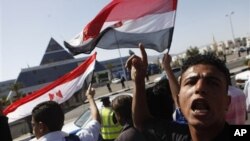Egypt’s former president Hosni Mubarak has been officially detained for a period of 15 days for investigation on accusations of corruption just hours after he was taken to hospital.
Egypt’s Prosecutor General Abdel Meguid Mahmoud announced Wednesday that former president Mubarak is being detained for questioning over embezzling public funds and abuse of power for using force against protesters during anti-government demonstrations earlier this year. The move followed the detention of his two sons, Alaa and Gamal, hours earlier.
Mr. Mubarak spent the night in the presidential suite of the Sharm el-Sheikh general hospital. Al Arabiya TV indicated that he may be taken to a military hospital closer to Cairo for further questioning.
Egyptian TV reported that the former president had a heart attack during questioning Tuesday. Egypt’s justice minister indicated that the former president’s questioning continued after his hospitalization.
Mr. Mubarak’s two sons were reportedly flown by private plane to Cairo early Wednesday, where they were transferred to Toura Prison near the suburb of Helwan. Cairo media also reported that the two were transported in a police van after their interrogation Tuesday.
Counselor Timor Kamel of Egypt’s Administrative Prosecution Department said that the former president would be questioned over political, criminal and financial matters. He said that Mr. Mubarak will be questioned over the killing of protesters during January’s demonstrations, administrative corruption and squandering of public money.
The ousted president has said the allegations against him are unfounded, and that he has the right to defend his reputation and that of his family. His remarks were broadcast Sunday by the Al Arabiya news channel.
Several of the former president’s longtime associates, Ahmed Fathi Sarour and Safwat Sherif, have also been detained in the past several days. Former prime minister Ahmed Nazif was detained over the weekend. Other former ministers were detained weeks ago.
Said Sadek, who teaches political sociology at the American University of Cairo, said many Egyptians applaud the arrests, because they were afraid the former president and his close associates were in the process of trying to incite "a counter-revolution:"
"In many revolutions, if you do not take a strong stand to neutralize the leading members and leaders of the previous regime they can cause trouble and they would lead what is called the counter-revolution. And so, this is a very strong political step that was taken and it would get rid of this attempt by the counter-revolution to cause problems," he said.
Several hundred thousand Egyptian protesters turned out in Cairo’s Tahrir Square Friday to call for a purge of former top officials and for trials over alleged corruption and wrong-doing. Protesters also skirmished with military police over the weekend, refusing to evacuate the square until the ruling military council acted against the former officials.
Hospitalized Mubarak Officially Detained in Egyptian Corruption Probe




